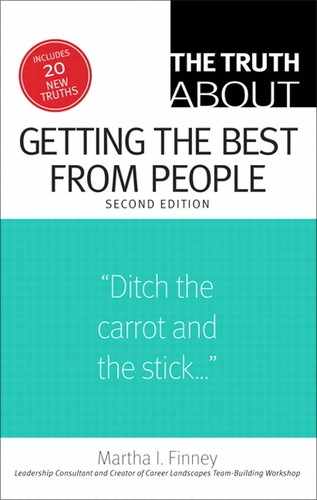Truth 20. Authentic is better than clever
In 1950, movie actor James Stewart played Elwood P. Dowd, the pixilated best friend of a 6ft... well, 6 ft. 3 (and a half) imaginary (as if you needed to be told that part) white rabbit named Harvey. Dowd’s charm is not the companionship of the bunny, though; it’s the exceedingly, consistently guileless, open-faced, courteous way he treats people. In the movie’s key moment, he says, “My mother told me, ‘Elwood, you must be oh so smart. Or oh so pleasant.’ Well, for years I was smart. I recommend pleasant.”
Every day you are faced with a similar choice in the way you lead your people. How you make that choice reflects your personal values and what you believe is the essential foundation of a healthy, functioning relationship. Only this choice isn’t between pleasant and smart; it’s between authentic and clever. And what’s cool about this choice is that if you make it right, you won’t have to make it at all.
Choose authenticity every time. Authenticity gives you huge returns on your investment of courage and backbone. It gives you clarity in uncertain, confusing times. It helps you be consistent in the way you establish your expectations from your people. And your people know what they can consistently expect from you. You are believed and trusted without suspicion of subtext and subterfuge. And when you make a mistake (and you will), you will be forgiven.
Choose authenticity every time.
Sure, authenticity may seem like the obvious choice, especially while you’re sitting there, all comfortable in your chair, reading this book. Authenticity is actually scary. It is the adventurous choice demanding courage, the ability to meet painful decisions head on, the willingness not to be in control all the time, and the faith to trust your people to do the right thing with the truth and reality that you give them unfailingly. Authenticity demands honesty, even when it means that you might not be fair or popular. You stand to lose a lot, at times, by being real with your people. But if your reputation is being more clever than authentic, you stand to lose much more, much more often.
It’s sometimes difficult, though, to resist the temptation to choose the clever way. As a manager, you’re being paid to think a couple of steps ahead, and that requires cleverness. But the wrong kind of cleverness can erode the healthy, open environment that authenticity has built. Then maybe you don’t communicate as much as you know as often as you can with your employees as you once did. Management fads start looking like fun experiments to see if you can boost your group’s productivity a couple of notches, which is especially attractive if you’re in a highly competitive environment. Little games, overt and covert, start seeping into your group’s culture. People start wondering what you’re really up to. And then they start wondering what each other is up to. And they start getting competitive with each other. Then no one’s happy. And it stays that way.
Here’s the fun part: A track record for authentic leadership buys you permission to be clever. Your reputation for straightforward dealings and honest communication will help you bank the trust currency you can then use to think several steps ahead and creatively (and honestly, and legally) work the system to your business’s advantage.
The wrong kind of cleverness can erode the healthy, open environment that authenticity has built.
Here’s how to know when authenticity is essential: You use it to lead your people.
Here’s how to know when clever is okay: You use it to serve your people.
Keep that distinction in mind, and you’ll be oh-so trusted. And I recommend trusted.
